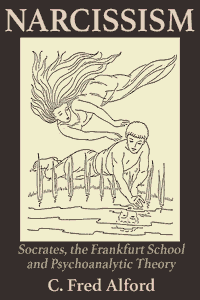
Narcissism:Socrates, the Frankfurt School, and Psychoanalytic Theory
Publisher: Yale University Press
Please provide your name and email to get free downloads.
Downloaded 2945 times since
The term narcissism is normally used to describe an infatuation with the self so extreme that the interests of others are ignored. However, argues C. Fred Alford, psychoanalytic theory also implies that narcissism can be construed in a positive way, as a striving for perfection, wholeness, and control over self and world. In this book, Alford applies the psychoanalytic theory of narcissism to the philosophies of Socrates and Frankfurt School members Max Horkheimer, Theodor Adorno, Herbert Marcuse, and Jurgen Habermas, contending that it can illuminate basic philosophical issues such as the nature of the ideal society, the integrity of the self, and the role of reason in human affairs.
Alford uses the work of Freud, Klein, Kohut, and other psychoanalysts to buttress his thesis that narcissistic longing for human perfection links humanity’s most primitive needs with its most sublime achievements, that the sublimation of narcissism leads us to seek and create beauty and to maintain our own integrity. Contending that Plato’s account of eros is more compelling psychologically than Freud’s account, Alford points out that while Freud stresses the origin of narcissism in primitive needs, Plato emphasizes the higher purposes that eros may serve. Alford further argues that Plato’s account of sublimation can help us better understand the philosophical dilemma of the Frankfurt School, which insists that we respect the claims of reason while at the same time fully appreciating the intensity of the nonrational demands generated by the narcissistic pursuit of perfection. (332 pp.)
Reviews
“In its scope as well as depth, this is a scholarly, comprehensive, original, and ultimately convincing argument.”
–Stanley Aronowitz, City University of New York
“Alford’s bold and surprising defense of the virtues of narcissism cuts across the grain of conventional wisdom. In so doing, he provides arresting new readings of familiar tests, ranging from the Greeks to the Frankfurt School. No one, however persuaded they may be by his ambitious argument, will be able to return to those texts in the same way as before.”
–Martin Jay, University of California, Berkeley
Chapter eBooks
- After Virtue, Narcissism | Alford, C. Fred | 540 downloads
- The Psychoanalytic Theory of Narcissism | Alford, C. Fred | 804 downloads
- Socrates, Eros, and the Culture of Narcissism | Alford, C. Fred | 550 downloads
- Adorno and the Retreat from Eros | Alford, C. Fred | 474 downloads
- Narcissism and Civilization: Marcuse | Alford, C. Fred | 512 downloads
- Habermas and the End of the Individual | Alford, C. Fred | 535 downloads
- Narcissism and Philosophy | Alford, C. Fred | 606 downloads
Our staff has been up all night selecting the best new e-books to share. Will you send us a few bucks to keep the coffee flowing?

